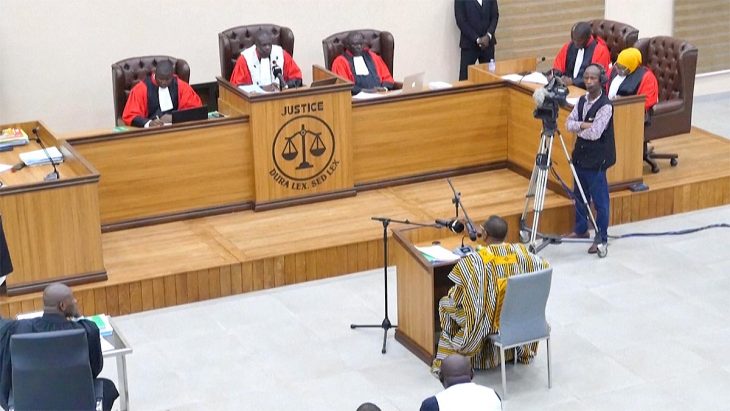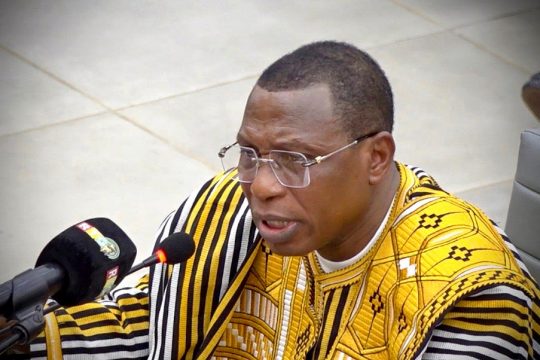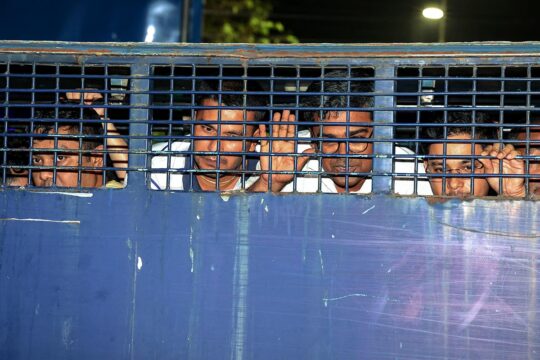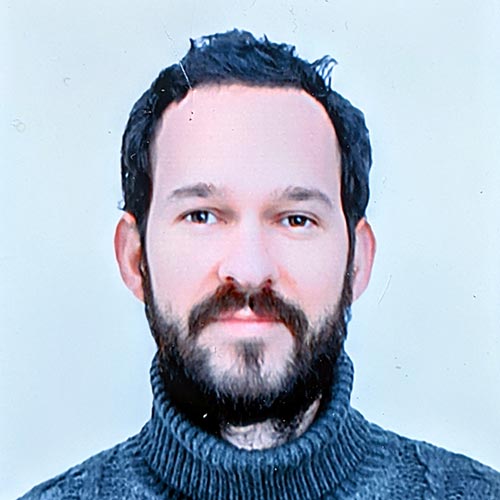He is there, behind the wooden lectern, in front of the magistrates, under the eyes of the public and the cameras. Moussa Dadis Camara in the flesh, wearing his festive boubou, is being questioned and his appearance is being broadcast live on Guinean television. Who could have imagined it? Four months earlier, three days before the opening of the trial, the former junta leader was still in Burkina Faso, the country where he had settled to live in peaceful exile after he was ousted in January 2010. He is accused of having played a leading role in the massacre of more than 150 people on September 28, 2009, during a meeting organized in a Conakry stadium by opponents of his regime. To everyone's surprise, Dadis Camara decided to return to Guinea and "make himself available to justice" and deliver his part of the truth.
He was the ninth defendant to be called to the stand. His interrogation began in early December and has been going on ever since. "We thought that Toumba (his former aide-de-camp and co-accused) had broken the record for the number of days he appeared in court, but Dadis stayed even longer," said Diawo Barry, a Guinean journalist who writes for Jeune Afrique and has been covering the trial since it began in September. After twelve appearances, some Guineans now want "Dadis", as they call him, to leave the stand. "I want more defendants to be questioned so that the excitement of the trial returns," said Mohamed, a 37-year-old teacher, in an open-air café in Conakry where a television is broadcasting the hearings. "Just this morning, I told the other customers that it was better to watch entertainment than to watch Dadis. You don't learn anything from him."
Dadis, loser of the media duel
The person leading the questioning, whether he is a magistrate, a lawyer for the civil parties or even the defence, is often obliged to repeat his question, to rephrase it so that Dadis understands. This upsets the rhythm to the hearings. In addition, the former head of state is difficult to follow. He regularly rambles on with endless and irrelevant answers.
"We are not going to say that everything Toumba said is the truth, but we feel he is much closer to it than Dadis, because Dadis does not talk,” said Mohamed. The popularity duel has turned to Toumba’s advantage. It is true that Dadis still has diehard supporters among the Guinean population, especially in his home region of Forest Guinea in the southeast of the country. But on YouTube, the numbers are clear. Some videos of Toumba's appearances have accumulated more than 300,000 views, while those of Dadis have not taken off, stagnating at only a few tens of thousands.
Aboubacar Diakité alias "Toumba" succeeded in captivating Guineans with revelations on how the junta seized power at the time, describing the strategies it used to assert power. Dadis, for his part, sums up his rise to president in a few words: "No one gave me power, it was God and the entire Guinean army.” He refuses to go into details.
Is this part of his defence strategy? Sometimes he says as little as possible, while at others he answers questions in a convoluted way. In the end, he never gives the impression of being comfortable. "Staying on the defensive presents him to observers as someone of bad faith. Because he was President, because he said he wanted the truth to come out, and so as to sympathize with the pain of the victims, he should make his contribution. This does not necessarily mean incriminating himself, but clearly saying what he knows," says Barry.
"We are disappointed"
On the stand, Dadis remains constantly seated. He looks exhausted. His first appearance, on December 5, 2022, lasted only seven minutes, which was enough time to say he couldn’t continue for health reasons. The presiding judge then gave him a week to recover. During the next appearance he lost his voice, forcing the court to decide on a new adjournment of a few days to allow the defendant to get better.
This scenario increased the suspense, with Dadis being the accused who had raised the most expectations. Mohamed does not hide his disenchantment today. "We are disappointed. People are no longer interested in the trial,” he says. The same sentiment is echoed by Barry: "He should tell more, I expected much better from him." The journalist tries to analyse his behaviour. "When the serious stuff started, I have the impression that he was surprised, especially perhaps by the strategy adopted by Aboubacar Toumba Diakité. I have the impression that this disarmed him a bit.” In reaction, "he adopted this strategy of silence”.
In the past, however, Dadis had marked the Guinean collective memory by his omnipresence in the media. When he was president of the transition, he regularly interrupted the broadcasts of national television to give impassioned speeches during which he sometimes dismissed officials in a spectacular way. But those who were looking forward to the new season of the "Dadis Show" during the trial had to be content with a few fits of anger.
And the court would not have it. "Calm down Mr. Camara! Just answer!" The president of the court, Ibrahima Sory 2 Tounkara, regularly reprimands the ex-putschist and interrupts his tirades that are unrelated to the question asked.
Dadis the Zen master
Dadis Camara visibly makes efforts during certain hearings to appear calmer, not to lose his temper, as when faced with Paul Yomba Kourouma, one of Toumba's lawyers who had promised to "finish him off”. Their confrontation on January 16 took place in an unearthly calm. Dadis responded in a soft voice, even when the lawyer tried to provoke him. "I will address you in the fluent French that you have requested,” he said. “If you want an interpreter, we can ask the court for one.” Dadis did not flinch.
Asmaou Diallo, president of the Association of Victims, Parents and Friends of September 28 (AVIPA), expressed her anger: "The behaviour of Moussa Dadis Camara revolts me because I have the impression he is not at all ready to give his version correctly. It makes the victims uncomfortable," she told RFI. There is no question of Dadis apologizing either, at least not for the moment. He reserves his apology for the end of the trial, after the guilty parties have been convicted and he has been "acquitted”, he says. "I have said clearly, those who committed the acts, let them acknowledge them first,” he said on December 20 at the Dixinn Criminal Court. “Once they recognize their acts, I will be the first to ask for forgiveness."








